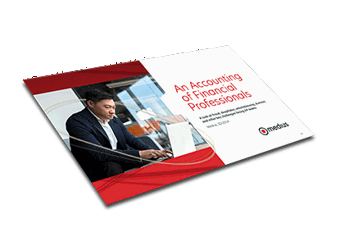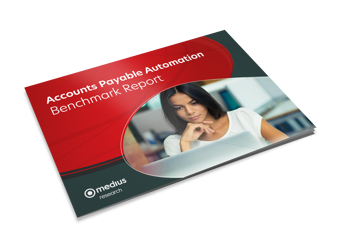Top challenges for accounts payable and finance professionals in 2024
New Medius research reveals invoice and internal fraud, deepfake scams, whistleblowing fears, and more as top concerns.
We live in a digital world, which brings trials, tribulations, and risks for today’s finance teams. Accounts payable professionals and finance leaders have a tough job—keeping budgets in order, finances in check, and the bottom line protected. The pressure is rising for AP professionals, and it shows.
So, what is keeping finance leaders up at night in 2024?
Our latest research—captured in Medius’s 2024 Financial Census—shows that some age-old common problems still exist, some existing challenges are growing more challenging, and new issues are emerging.
Let’s break down the latest challenges for accounts payable and finance professionals in 2024.
Invoice fraud (and more) remains.
Organized crime groups and individual perpetrators are taking advantage of businesses with paper trails and dated accounting and invoice processes.
Nearly half of the organizations surveyed were targeted by invoice fraud. What? That is alarming in today’s day and age. On average, finance professionals reported 12 cases of attempted invoice fraud in the last year. And those are just the fortunate ones who managed to spot (and hopefully, stop) the fraud; there is no hard data on the fraud that went undetected.

-
44% of businesses have been targeted by invoice fraud
-
Business Email Compromise (BEC) scams hit 43% of businesses surveyed
What is invoice fraud?
Invoice fraud happens when someone sends bogus bills to a company. It might be for a good or service that was never provided. Or they might even try to claim an existing vendor's contact or payment details have changed, providing false information to defraud the company of money.
See common invoice fraud schemes, and how to spot and stop them.
Invoice fraud has been a challenge among finance teams for quite some time, but luckily, advancements in technology and automation can combat it.
Learn how you can get control and visibility to put a stop to fraud.
Look out for business email compromise (BEC) scams.
Invoice fraud isn’t the only fraud targeting accounts payable and finance teams. Business Email Compromise (BEC) scams also occurred among 43% of businesses surveyed. And 34% of companies were targeted by identity theft in the last year.
What is a Business email compromise (BEC)?
Vendor fraud schemes use phishing scams by sending an email that seems to be from a trusted source making a legitimate request. However, the email address is slightly different.
Common scenarios include:
- Fake invoices
- Messages trying to trick victims into revealing confidential information
- Malicious software infiltrating company networks
Fraud attacks in accounts payable and finance can happen in several ways, including:
- Duplicate invoices or payments
- Wire or electronic transaction alterations
- Foreign transactions alterations
- Stolen credit card information
- Altered invoices or payments
- Expense report and reimbursement alterations
- Stolen bank information
- Deepfake voice fraud
Finance leaders are trying to tackle it, but it's a challenge, especially when the burden lies solely on them for fraud prevention.
Deepfake scams are on the rise.
Deepfake fraud scams are the latest rising worry in businesses, with fraudsters focusing on finance, research reveals. Fifty-three percent of finance professionals reported being targeted by attempted deepfake scams. And, 43% of them admit they fell victim to a deepfake attack.
What is a deepfake scam?
A deep fake scam happens when someone uses a fake video, audio, or image of a real person, altering it digitally—often with AI—to deceitfully misrepresent them.

According to a recent CNBC article, “In one of the largest known case this year, a Hong Kong finance worker was duped into transferring more than $25 million to fraudsters using deepfake technology who disguised themselves as colleagues on a video call, authorities told local media in February.”
Our research also showed that 87% of professionals admitted they would make a payment if “called” by their CFO and CEO. With AI, it's getting harder to tell what’s real and what’s fake today. Many employees –33% of respondents—don’t feel educated enough on deep fakes.
While it’s a growing trend, only 40% of professionals say it's a top priority. We’ll see how these numbers change over the next few years. It’s certainly an area to watch.
Combatting internal fraud – whistleblower fears and foes.
Did you know that more than half of financial professionals in the UK and US (56%) have spotted or suspected internal fraud in their workplaces?
Look around your office or team, and it’s hard to imagine that happening right in front of your nose. But it does.
That’s not the scary part, however. What’s alarming is that most 81% of those who spot fraud stay silent. Why? Because they fear recrimination if they speak up.

Employees are afraid to be whistleblowers because they’ve witnessed other whistleblowers suffer negative repercussions, such as being demoted, ostracized, or even fired. It’s a shame that so much money is lost, data is compromised, and reputations are damaged—and some of it can be prevented if we empower those with the tools and protection they need to speak up.
More than a staggering 93% of workers say they would feel more comfortable if they had more evidence, and 48% say they’d speak up if they thought the legal system protected them better.
We have to work as an industry and team to address this issue – and bring fraudsters to a stop.
Talent retention challenges for finance.
Managing spending is complex, but effective management is key to company growth, security, and reputation. When processes and AP automation tools are in place to help finance professionals manage spend – and tackle AP challenges like fraud– they are happier, more confident, and more productive.
However, many finance professionals feel pressured and experience burnout. Our research shows:

-
58% of finance professionals in the US and 71% of finance professionals in the UK are looking for a new job right now.
-
More than half (55%) said they are experiencing burnout, part of which may be centered around mundane tasks.
It can be a tough job, with more challenges to tackle and more riding on their shoulders, so there’s a lot for finance professionals to consider when taking a new job or staying at an existing one.
Many want to spend their time being more strategic instead of chasing invoices, answering supplier emails, and fixing manual errors in their system. An AP manager's day should be smooth and strategic.
The good news? Many things can combat retention challenges, but one thing is certain: AI-driven accounts payable automation can streamline many parts of the AP process, help with fraud prevention, and automate those pesky routine tasks.
A quick look at how AP automation helps:
What are the main impacts of automation on the role of the finance professional?

Take away some of the frustrations, and you’ll likely see your finance team happier and more effective.
Challenges will always exist.
Finding the right solution is key.
In the coming years, finance teams will continue to encounter obstacles that require innovative solutions. Some challenges will persist, while others will fade away due to advancements like autonomous AP. The true potential of AI and machine learning in AP lies not in streamlining processes but in eliminating them altogether.
What tools does your AP department use? Consider the transformative impact of AI on these hurdles and take steps toward a future marked by reduced stress, enhanced security, and happier employees.









